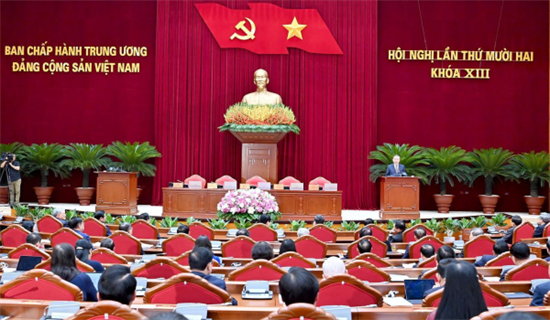The issue of developing a socialist-oriented market economy in the draft Political Report submitted to the 14th National Congress of the Communist Party of Vietnam
The draft Political Report of the 13th Party Central Committee, to be submitted to the 14th National Congress of the Communist Party of Vietnam (hereinafter referred to as the Draft Political Report), continues to elaborate on the Party’s line regarding the development of a socialist-oriented market economy in Vietnam. It introduces a number of breakthrough points in both theoretical and practical terms, with the aim of fully harnessing the potential and strengths of the socialist-oriented market economy, thereby advancing the overarching goal of prosperous people, a strong nation, democracy, equity and civilisation” in the new era.
 |
| The 13th Party Central Committee’s 12th Plenum decided to conduct a drastic reform in designing documents of the 14th National Party Congress (photo: dangcongsan.org.vn) |
The issue of developing a socialist-oriented market economy “constitutes a fundamental and innovative theoretical breakthrough of our Party”. It represents our Party’s major theoretical achievement over the course of Doi Moi and national construction and development. Since the 6th National Congress, the Party’s understanding of the socialist-oriented market economy has undergone continuous supplementation and refinement. At the 13th National Congress, the Party articulated the view that: “The socialist-oriented market economy is our country’s overall economic model during the transitional period toward socialism. It is a modern, internationally integrated market economy that functions fully and consistently in accordance with the laws of the market, under the management of a socialist rule-of-law state led by the Communist Party of Vietnam. It ensures the socialist orientation toward the goal of prosperous people, a strong nation, democracy, equity and civilisation, in line with each stage of the country’s development”. On the basis of reviewing 40 years of Doi Moi in practice, the draft Political Report submitted to the 14th National Congress has introduced a number of new, breakthrough points on the development of the socialist-oriented market economy, in both theoretical and policy terms.
First and foremost, by affirming the inevitability and necessity of continuing to develop the socialist-oriented market economy in Vietnam, the draft Political Report applies Marxist - Leninist theory on socio-economic formations to identify it as one of the three pillars of the Vietnamese model of socialism, namely the socialist-oriented market economy, the socialist rule-of-law state, and socialist democracy. This represents a significant new development in the Party’s theoretical understanding compared with previous congresses where the Party defined the socialist-oriented market economy merely as Vietnam’s overall economic model during the transition to socialism. In this draft Political Report, however, the socialist-oriented market economy is positioned as an element of the economic base of the Vietnamese socialist model, placed in a dialectical relationship with the superstructural elements, namely the socialist rule-of-law state and socialist democracy. Only by building these three pillars simultaneously can Vietnam realise the goal of socialism.
Second, the position and role of economic components of the socialist-oriented market economy constitute another new and prominent feature of the draft Political Report. Whereas the 13th National Congress affirmed the leading role of the state-owned economy in Vietnam’s socialist-oriented market economy, expressed in the statement that “the state-owned economy is an important tool and material force enabling the State to stabilise the macroeconomy, provide orientation, regulation, guidance, and impetus for socio-economic development, and address the shortcomings of the market mechanism”, the draft Political Report defines this leading role in a clearer and more practical manner reflected in: “ensuring major economic balances, setting strategic directions, and guiding the economy”. A breakthrough point lies in the new perception of the role of the private economy. No longer viewed merely as “an important driving force” (as the 13th Congress stated), the private economy is now “the most important driving force of the national economy”. This contributes to eliminating lingering prejudice against the private economy in Vietnam, and provides a more accurate and practical assessment of its role within the socialist-oriented market economy. After nearly 40 years of Doi Moi, the private economy in Vietnam has grown to encompass more than 940,000 enterprises and nearly 5 million household businesses, contributing around 50% of GDP, over 30% of total state budget revenue, and employing more than 82% of the national workforce.
With respect to the collective economy, the cooperative economy, and the foreign-invested economy, the 13th Congress documents did not specify their position and role within the socialist-oriented market economy. Instead, they merely affirmed that the collective and cooperative economy should be “constantly consolidated and developed” while the foreign-invested economy should be “encouraged to develop in accordance with and socio-economic development plans and strategies”. In contrast, the draft Political Report clarifies and recognises the important role of the collective economy, the cooperative economy and the foreign-invested economy. This ensures a unified articulation of the position and role of economic components of Vietnam’s socialist-oriented market economy.
 |
| Economic development is crucial to socialism building in our country (photo: tuyengiao.vn) |
Third, with respect to the types of markets within the socialist-oriented market economy, the draft Political Report continues to stress the need for the comprehensive, synchronous, and healthy development of various markets of a modern, internationally integrated market economy. These include the goods and services market, the financial market (comprising the capital market and monetary market), the real estate market, the land-use rights market, the minerals market, the energy market and the labour market, among others. A notable innovation in the draft Political Report is its reference to the development of a new market, “the carbon credit market”. It emphasises the necessity of “establishing and effectively operating a domestic carbon credit market connected to regional and global markets”, thereby enabling Vietnam to harness its considerable potential for carbon credits to supply both domestic and international demands. The formation and operation of the carbon credit market will allow Vietnam to maximise benefits from international trade agreements (such as the EU - Vietnam Free Trade Agreement), to enhance its capacity to attract foreign direct investment (FDI) and to strengthen export competitiveness, particularly in demanding markets that place strong emphasis on environmental protection, such as the European Union. At the same time, this makes it possible for Vietnam, as a signatory to the United Nations Framework Convention on Climate Change, to fulfil its climate commitments and to advance towards its net-zero target by 2050.
Fourth, regarding the solutions for developing the socialist-oriented market economy, the draft Political Report proposes a relatively comprehensive and coherent set of measures, featuring several innovations. Central to these proposals is the emphasis on “continuing to promote the socialist-oriented market economy institutions, and correctly addressing the relationship between the State, the market, and society”. Accordingly, the State minimises administrative intervention in the market, managing and steering the economy through legal instruments, planning, policies, and macroeconomic regulatory tools. The market plays a decisive role in determining the prices of goods and services, efficiently mobilising and allocating development resources, and regulating production, circulation, and enterprise activities. Society and social organisations serve as complementary actors to both the State and the market, addressing emergent issues among members, representing the legitimate aspirations and interests of the people to the State, and participating in oversight of the State’s laws, regulations, and policies. To enhance the role of the State within the socialist-oriented market economy, the draft Political Report underscores the need to accelerate administrative reforms, “creating breakthroughs in improving a favourable, transparent, stable, and open business and investment environment sharply reducing administrative procedures for investment, production, and business activities, particularly in accessing resources, markets, and business opportunities” for enterprises and citizens.
A breakthrough solution is the promotion of digital government and digital society so as to facilitate development and sustainable social management along with decentralisation and delegation of authority between central and local levels, thereby strengthening the autonomy and accountability of local governments. It calls for a fundamental shift in mindset from “passive, management-focused”, associated with the “ask-give” mechanism in the provision of public services, to a mindset that is “proactive and flexible in enabling development and serving the people and enterprises”.
In parallel with addressing the State - market - society relationship, the draft Political Report also sets forth the requirement to “perfect superior institutions to accelerate industrialisation, modernisation, and economic restructuring”, incorporating numerous new elements. It highlights the need to reform the economic structure by establishing a new growth model prioritising productivity, quality, efficiency, added value, and competitiveness while science, technology, innovation, and digital transformation are identified as the main drivers. The Political Report emphasises the promotion of digital transformation and green and energy transitions in conjunction with high-quality human capital development, forming strong growth poles, key economic zones, and globally and regionally connected urban centres. It calls for regional linkages, expanding and restructuring development space aligned with the new administrative system, with a focus on digital, green, and circular economies. Regarding industrialisation and modernisation, the draft Political Report introduces a new requirement: “Effectively balancing domestic production autonomy with participation in global production networks and value chains, with science, technology, and innovation as the main drivers, and international integration as the means to mobilise all resources for industrialisation and modernisation”. This is the correct path to an independent, self-reliant, and globally integrated economy in the context of globalisation.
The draft Political Report emphasised another important solution related to ensuring the socialist orientation of the market economy in Vietnam, which, is “close integration of economic development with the assurance of social progress and equity”. Accordingly, it is necessary to “ensure social progress, social equity, social security, social welfare, societal and human security, to establish a modern, multi-tiered, flexible, life-cycle-based, and universally inclusive social security system, with a people-centred approach aiming to enhance overall social welfare, to prioritise policy beneficiaries, vulnerable groups, and those in the informal sector, in accordance with Vietnam’s development conditions and level, leaving no one behind”. A notable innovation in this draft is the goal that, by 2030, Vietnam will basically eliminate poverty and realise universal hospital fee waiver.
The issue of developing the socialist-oriented market economy in the draft Political Report embodies the crystallisation of theoretical achievements and practical lessons accumulated by the Party over 40 years of Doi Moi, nation-building, and development. The fundamental viewpoints in the draft not only inherit the theoretical insights of previous National Congresses but also incorporate numerous new, breakthrough elements, aligned with the country’s developmental requirements in terms of both productive forces and production relations in the new era, aimed at progressively realising the objectives of socialism in Vietnam. Every cadre and Party member is required to take the lead in studying those viewpoints, contributing to the successful organisation of all-level Party congresses towards the 14th National Congress of the Communist Party of Vietnam.
NGUYEN NGOC HOI